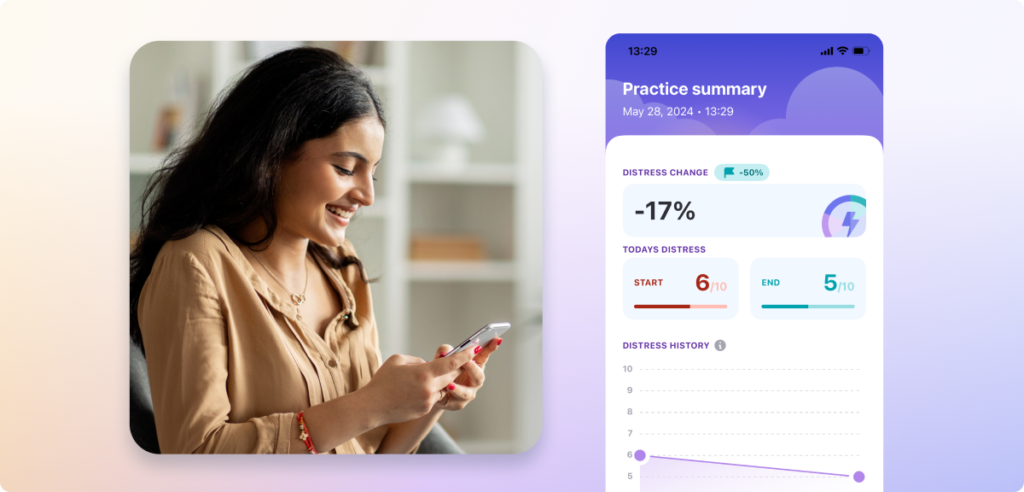NOCD is a virtual therapy company with a mission to get people with OCD into proper treatment. Our staff includes hundreds of qualified therapists, as well as leadership with decades of experience treating and researching OCD. We operate through live, face-to-face virtual therapy and provide personal support between sessions, because you never know when OCD may strike.
Every NOCD therapist has received intensive training and evaluation in the most effective OCD treatment: exposure and response prevention (ERP) therapy. They understand and treat every OCD subtype, from religious concerns to relationship OCD to the most specific fears you can think of. We know that therapy can be expensive and that insurance is often a barrier to care, so we partner with the leading insurance providers to make it more affordable, including Kaiser Permanente, Aetna, BlueCross BlueShield, Cigna, and many more.
Common questions about NOCD
Are NOCD therapists qualified?
All of our therapists go through an extremely selective hiring process to ensure our team is well-equipped to treat all forms of OCD. NOCD therapists must be either masters- or Ph.D.-level clinicians and have a license that says they have the credentials to practice therapy in their state. After those qualifications are confirmed, our hiring team makes sure therapist candidates have adequate experience with one-on-one therapy and are able to treat taboo obsessions with empathy and without stigma. We also screen to make sure they’re culturally competent and can build trust across all types of communities.
Find the right OCD therapist for you
All our therapists are licensed and trained in exposure and response prevention therapy (ERP), the gold standard treatment for OCD.
Do NOCD therapists get special training?
If hired candidates pass in all the above areas, we move them on to our own three-month intensive, world-class training program before they begin working with Members. After graduating from the training onboarding, our therapists must pass multiple exams to ensure they deeply understand all the material they’ve been taught by our clinical leadership team. NOCD therapists also receive continuous education as they step into their roles.
Do NOCD therapists treat all ages and identities?
Not only are our therapists taught to understand the intricacies of OCD and master administering ERP—including hierarchy development, exposure techniques, response prevention strategies, and utilizing the NOCD platform for enhanced treatment delivery—but they’re also able to do this effectively across various age groups (ages 5 and up) and identities. Therapists are required to demonstrate cultural competency and respect for the diverse identities, beliefs, backgrounds, and orientations of all Members. This means learning about topics affecting BIPOC communities, such as antiracism and implicit bias.
Does NOCD therapy actually help OCD?
Numerous studies have proven NOCD’s treatment methods to be extremely effective for managing OCD. One study on virtual ERP therapy found that many people show an improvement in their symptoms within just 11 hours of virtual ERP therapy. We recently completed research on whether or not virtual ERP therapy is effective in children (starting at 5 years-old) as well as adolescents. We found that NOCD therapy resulted in clinically significant improvements related to OCD, depression, anxiety, and stress symptoms. This was achieved in approximately 65% fewer sessions than treatment-as-usual outpatient cognitive-behavioral therapy with ERP.
Why are some NOCD reviews negative?
No company is perfect and we’re ready to listen to your concerns about our product. Sometimes people don’t find the best therapist match on their first try, or have issues with figuring out how much their insurance will cover. Know that our team will work with you to get these issues resolved quickly so you can focus your energy on what’s the most important: managing your OCD and getting better.
Why is NOCD’s intake process so long?
Our intake process may seem time-consuming, but there’s a reason why we ask for a lot of information. During the first few sessions, your therapist not only needs to get to know you better, but also needs to understand your unique OCD symptoms. The condition manifests differently in each person, so spending a little time going over what you’re specifically dealing with is key to beginning an effective treatment plan. This gives them the specific information they need to create a detailed assessment of your symptoms, so you can tackle each one as you dive into sessions.
I have a co-occurring condition. Can NOCD help with that?
NOCD therapists are all trained to treat related conditions that often co-occur alongside OCD, like tic disorders and body-focused repetitive behaviors, and they receive training in behavioral activation (BA) for depression and behavioral treatments for anxiety disorders like panic disorder, social anxiety, and agoraphobia. We give our clinical team additional training opportunities in other specialized therapies, like prolonged exposure (PE) therapy for post-traumatic stress disorder or cognitive behavioral therapy (CBT) modalities for body dysmorphic disorder.
What people are saying about NOCD
At NOCD, we share every review, without any filters and are committed to transparency. We compiled a few reviews from across the internet to address concerns in an honest and open manner. From Reddit to our own community forum, read on to hear what people say about their real experiences with NOCD Treatment:
From our Community
The bottom line
Most therapy isn’t effective for OCD, but ERP is proven to make a difference. Book a free call to better understand our program and determine if it’s the right fit for you.

